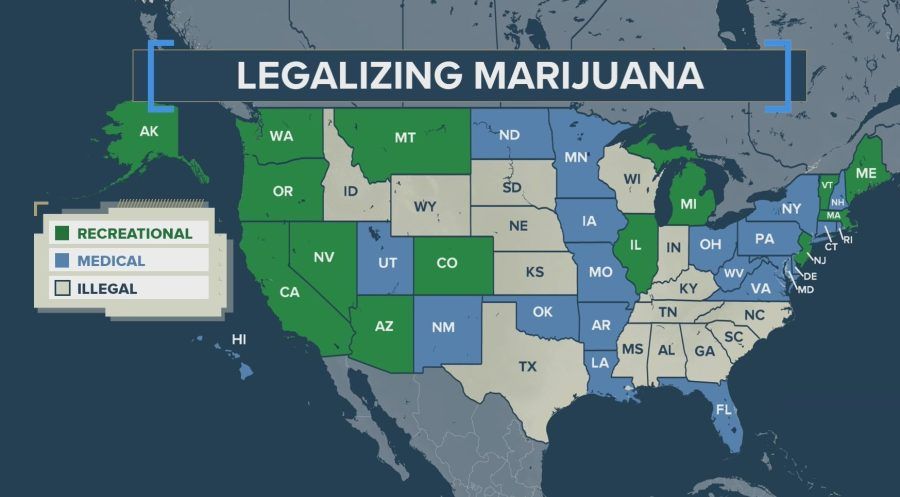Did Kamala Harris Flip-Flop On Marijuana Again To Adopt Biden’s Anti-Legalization Position?
Does Vice President Kamala Harris still support legalizing marijuana? According to a short passage buried in a new Bloomberg report about efforts to appoint a new top White House drug policy official, the answer seems to be no.
Harris, who sponsored a comprehensive Senate bill to end federal cannabis prohibition in 2019, has now reportedly adopted the same position as President Joe Biden, who opposes legalization, the outlet reported on Monday.
There have been signs that might be the case, as Harris has stepped back her calls for broad reform in recent months, opting instead to push for cannabis decriminalization and expungements in line with the president’s agenda. She spent significant time during her own presidential campaign making the case for federally legalizing marijuana, but that specific narrative has been largely abandoned since she joined Biden’s presidential ticket in August.
Decriminalization and expungements is the favored policy of Biden, who also backs medical cannabis legalization, modestly rescheduling the plant under federal law and letting states set their own policies on the issue.
Bloomberg reported that an aide Harris’s team said her “positions are now the same as Biden’s,” though the source asked not to be named because the vice president hasn’t announced the policy shift. Marijuana Moment reached out to three press staffers in the vice president’s office for clarification, but they did not respond by the time of publication.
The lack of specificity leaves rooms for the possibility that the staffer was referring to Biden changing his position and embracing legalization as Harris has. But considering that the vice president’s rhetoric on the issue has shifted—with her reaffirming an administration commitment to simply “decriminalizing marijuana” and expunging records, rather than legalize the plant—it appears more likely that it’s Harris whose views have changed.
In September, for example, she simply said that “we will decriminalize the use of marijuanaand automatically expunge all marijuana use convictions and incarceration for drug use alone.”
This wouldn’t be the first time Harris has flip-flopped on cannabis. She was staunchly opposed to legalization and actively campaigned against a California reform initiative on the 2010 ballot during her time as the state’s attorney general, co-authoring an official voter guide argument stating that the measure “seriously compromises the safety of our communities, roadways, and workplaces.”
In 2014, Harris was asked about marijuana legalization in light of her Republican opponent for attorney general supporting it, and she dismissively laughed off the question.
But in 2018, she adopted a pro-legalization stance and signed onto descheduling legislation, saying “we need to start regulating marijuana.”
What this latest reported shift means practically for marijuana reform in 2021 is unclear. Senate Majority Leader Chuck Schumer (D-NY), Senate Finance Committee Chairman Ron Wyden (D-OR) and Sen. Cory Booker (D-NJ) are moving forward with plans to introduce a legalization bill this session, and they’ve already met with advocates and stakeholders to gain input on what that legislation should include.
If they were willing to push the issue despite Biden’s ongoing opposition to adult-use legalization, it stands to reason they will stay the course if reports about the vice president’s stance are true. That said, with the Senate split evenly among Democrats and Republicans, her position on the issue could come to the fore in the event that she’s needed as the tie-breaking vote on a legalization bill on the floor.
Coincidentally, it’s likely that parts of Harris’s Marijuana Opportunity, Reinvestment and Expungement (MORE) Act will be incorporated into their proposal, as the House version passed in that chamber last year and advocates favor its strong social equity provisions.
The news about Harris’s apparent change of heart on cannabis policy came as part of a Bloomberg report on the White House search for a “drug czar” to lead the Office of National Drug Control Policy. Former Rep. Patrick Kennedy (D-RI), a cofounder of the nation’s leading marijuana prohibitionist group, has been publicly lobbying the administration for an appointment to the position—much to the chagrin of reform advocates.
Meanwhile, an arguably more consequential nominee when it comes to federal drug policy is going through the confirmation process and said last week that he doesn’t think Justice Department resources should be wasted going after individuals acting in compliance with state marijuana laws.
“It does not seem to me useful the use of limited resources that we have to be pursuing prosecutions in states that have legalized and are regulating the use of marijuana, either medically or otherwise,” Judge Merrick Garland told the Senate Judiciary Committee.
Separately, the Biden administration is instituting a new policy of granting waivers to some White House staff who’ve used cannabis. The Office of Personnel Management has also distributed a memo last week to federal agencies stipulating that admitting to past marijuana use should not automatically disqualify people from being employed in the federal government.


